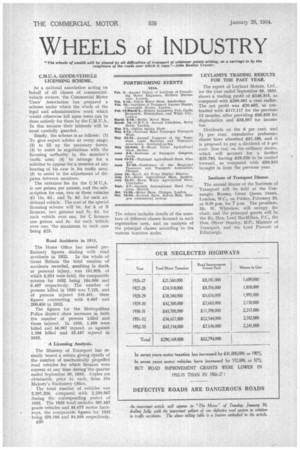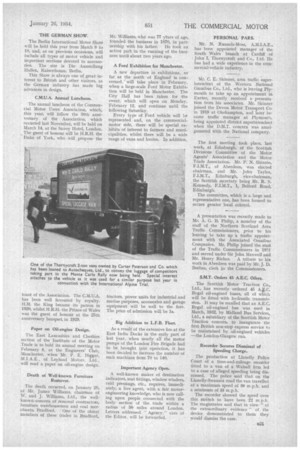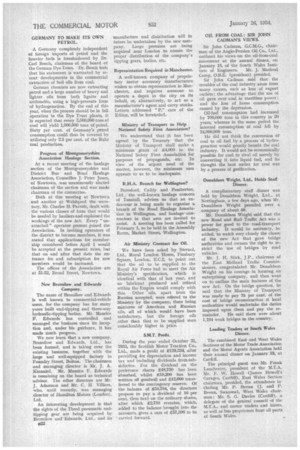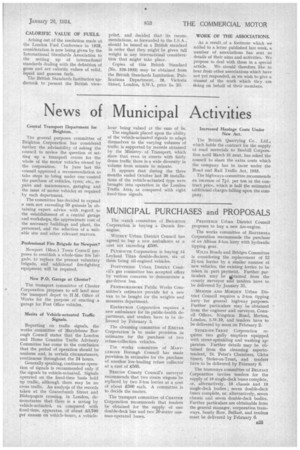WHEELS of INDUSTRY
Page 30

Page 31

Page 32

Page 33

If you've noticed an error in this article please click here to report it so we can fix it.
C.M.U.A. GOODS-VEHICLE LICENSING SCHEME.
As a national association acting on behalf of all classes of commercialvehicle owners, the Commercial Motor Users' Association has prepared a scheme under which the whole of the legal and administrative work which • would otherwise fall upon users can be done entirely for them by the C.M.U.A. In this manner their interests will be most carefully guarded.
Briefly, the scheme is as follows: (1) To give expert advice at every stage; (2) to fill up the necessary forms; (3) to assist in negotiations with the licensing authority in the member's traffic area; (4) to arrange for a solicitor to appear for a• member at any hearing of his case in his traffic area; (5) to assist in the adjustment of disputes between members.
The entrance fee for the C.:4.d.U..A. is one guinea per annum, and the subscription for one, two or three vehicles £1 1 Is. 6d., and 7s, 6d. for each additional vehicle. The cost of the special licensing scheme will be, for A or 13 licences, two guineas and 7s. 6d. for each vehicle over one, for C licences one guinea and 5s. for each vehicle over one. the maximum in each case being £25.
Road Accidents in 1933.
The Home Office has issued preliminary figures dealing with road accidents in 1933. In the whole of Great Britain the total number of accidents recorded, xesulting in death or personal injury, was 191,829, of which 6,924 were fatal, the comparable returns for 1932 being 184,006 and 6,487 respectively. The number of persons killed in 1933 was 7,125, and of persons injured 216,401, these figures contrasting with 6,667 and 206,450 in 1932.
The figures for the Metropolitan Police district show increases in both the number of persons killed and those injured. In 1933, 1,409 were killed and 56,967 injured, as against 1,266 killed and 62,447 injured in 1932.
A Licensing Analysis.
. The Ministry of Transport has recently issued a return giving details of the number of mechanically propelled road vehicles for which licences were current at any time during the quarter ended September 30, 1933. Copies are obtainable, price is. each, from His Majesty's Stationery Office.
The total number of vehicles was 2,297,326, compared with 2,239,567 during the corresponding period of 1932. The 1933 total includes 587,487 goods vehicles and 85,077 motor hackneys, the comparable figures for 1932 being 370,100 and 84,950 respectively.
1320 The return includes details of the numbers of different classes licensed in each registration area, and an analysis of the principal classes according to the various taxation scales. LEYLAND'S TRADING RESULTS FOR THE PAST YEAR.
The report of Leyland Motors, Ltd., ior the year ended September 30, 1933, shows a trading profit of £146,315, as compared with £296,561 a year earlier. The net profit was £20,662, as contrasted with £117,117 for the previous 12 mouths, after providing £68,820 for depreciation and £58,807 for income tax.
Dividends on the 6 per cent. and 71percent, cumulative preference shares have absorbed £51,188, and it is proposed to pay a dividend of 5 per cent, (less tax) on the-ordinary shares, which will account for a further £33,750, leaving £29,520 to be carried forward,, as compared with £93,835 brought in from the previous year.
Institute of Transport Dinner.
The annual dinner of the Institute of Transport will be held at the Connaught Rooms, Great Queen Street,, London, W.C., on Friday, February 16, at 6.30 p.m. for 7 p.m. The president, Mr. W. Whitelaw, will occupy the chair, and the principal guests will be the Rt. Hon. Lord MacMillan, P.C., the Hon. Oliver Stanley, M.P., Minister of Transport, and the Lord Provost of Edinburgh. THE GERMAN SHOW.
The Berlin International Motor Show w ill be held this year from March 8 to 18, and, as on previous occasions, will include all types of motor vehicle and important sections devoted to accessories. The site is Die Ausstellung "Jaen, Kaiserdamm, Berlin.
This Show is always one of great interest to British and other visitors, as the German industry has made big advances in design.
C.M.U.A. Annual Luncheon.
The annual luncheon of the Commercial Motor Users Association, which, this year, will follow the 30th anniversary of the Association, which occurred last November, will be held on March 14, at the Savoy Hotel, London. The guest of honour will be H.R.H. the Duke of York, who will propose the toast of the Association. The C.M.U.A. has been well favoured by royalty. 14.111. the King became its patron in 1920, whilst H.R.H. the Prince of Wales was the guest of honour at the 25th anniversary banquet, in 1929.
Paper on Oil-engine Design.
The East Lancashire and Cheshire section of the Institute of the Motor Trade is to hold its annual meeting on February 5, at the Engineers' Club, Manchester, when Mr. P. E. Biggar, M.I.A.E., of Leyland Motors, Ltd., will read a paper on oil-engine design.
Death of Well-known Furniture Remover.
The death occurred, on January 20, of Mr.. James Williams, chairman of NV. and J. Williams, Ltd., the wellknown concern of removal contractors, furniture warehousemen and coal mer chants, Bradford. One of the oldest members of these trades in Bradford, Mr. Williams, who was 77 ytars of age, founded the business in 1870, in partnership with his father. He took an active part in the running of the business until about two years ago.
A Ford Exhibition for Manchester.
A new departure in exhibitions, so far as the north of England is concerned,' will take place in February, when a large-scale Ford Motor Exhibition will be held in Manchester. The City Hall has been taken for the event, which will open on Monday, February 12, and continue until the following Saturday. Every type of Ford vehicle will be represented and, on the commercialmotor side, there will be special exhibits of interest to farmers and municipalities, whilst there will be a wide range of vans and lorries. In addition, tractors, power units for industrial and marine purposes, accessories and garage equipment will be well to the fore. The price of admission will be 1s.
• Big Addition to L.F.B. Fleet.
As a result of the extensive fire at the East India Docks in the early part of last year, when nearly all the motor pumps of the London Fire Brigade had to be brought into operation, it has been decided to increase the number of such machines from 70 to 140.
Important Agency Open.
A well-known maker of destination indicators, seat fittings, window winders, cold pressings, etc., requires, inunediately, a live agent, with a fair motorengineering knowledge, who is now calling upon people connected with the body section of the trade within a radius of 50 miles around London. Letters addressed " Agency," care of the Editor, will be forwarded. PERSONAL PARS.
Mr. N. Runnels-Moss, has been appointed manager of the South Wales branch at Cardiff of John I. Thornycroft and Co., Ltd. He has had a wide experience in the commercial-vehicle industry.
Mr. C. E. Skinner, area traffic superintendent of the Western National Omnibus Co., Ltd., who is leaving Plymouth to take up an appointment in Exeter, recently received a• presentation from his associates. Mr. Skinner joined the Devon Motor Transport Co. in 1919 at Okehampton, and later became traffic manager at Plymouth, being appointed district superintendent when the DILI', concern was amalgamated With the National company.
The first meeting took place, last week, at Edinburgh, of the Scottish Divisions Committee of the Motor Agents' Association and the Motor Trade Association. Mr. P. N. Shinnie, F.I.M.T., of Aberdeen, was elected chairman, and Mr. John Taylor, F.I.M.T., Edinburgh, vice-chairman, the Scottish secretary being Mr. R. S. 'Kennedy, F.I.M.T., 1, Belford Road, Edinburgh.
The committee, which is a large and representative one, has been formed to secure greater local control.
A presentation was recently made to Mr. A. G. B. Philip, a member of the stall of the Northern Scotland Area Traffic Commissioners, prior to his leaving to take up a traffic appointment with the Associated Omnibus Companies. Mr. Philip joined the stall of the Traffic Commissioners in 1931 and served under Sir John Maxwell and Mr. Henry Riches. A tribute to his work in Aberdeen was paid by Mr. J. D. Beebee, clerk .to the Commissioners.
S.M.T. Orders 45 A.E.0 Oilers.
The Scottish Motor Traction Co., Ltd., has recently ordered 45 A.Z.C. Regal oil-engined buses, all of which will be fitted• with hydraulic transmission. It may be recalled that an A.E.C. Regal oil-engined bus was used in March, 1932, by Midland Bus Services, Ltd., a subsidiary of the Scottish Motor Traction concern, to inaugurate the first British non-stop express service to be maintained by oil-engined vehicles —the London-Glasgow run.
Recorder Secures Dismissal of Speeding Charge.
The production at Llanelly Police Court of a time-and-mileage recorder fitted to a van of a Walsall firm led to a case of alleged speeding being dismissed. The police said that on the Llimelly-Swansea road the van travelled at a maximum speed of 39 m.p.h. and a minimum of 35 m.p.h.
The recorder showed the speed over this stretch to have been 22 m.p.h. The magistrates said that in view " of the extraordinary evidence " of the device demonstrated to them they would dismiss the case. GERMANY TO MAKE ITS OWN PETROL.
A Germany completely independent of foreign imports of petrol and the heavier fuels is foreshadowed by Dr. Carl Bosch, chairman of the board of the German Dye Trust. Dr. Bosch feels that his statement is warranted by recent developments in the commercial extraction of fuel oils from coal.
German chemists are now extracting petrol and a large number of heavy and lighter oils from both lignite and anthracite, using a high-pressure form of hydrogenation. By the end of this year, when the process should be in full operation in the Dye Trust plants, it is expected that every 3,500,000 tons of coal will 'yield 1,000,000 tons of petrol. Sixty per cent. of Germany's petrol consumption could thus be covered by utilizing only 2.3 per cent. of the Ruhr coal production.
Progress of Montgomeryshire Association Haulage Section.
At a recent meeting of the haulage section of the Montgomeryshire and District Bus and Road Haulage Association, Councillor J. Peter Jones, of Newtown, was unanimously elected
• chairman of the section and seas-made chairman of the committee.
Both atthis meeting at Newtown and another at Welsh-pool the secretary, Mr. Charles H. Parrish, dealt with
• the various classes of form that would be needed by hauliers and explained the workings of the new Act. Every " unattached " operator present joined the Association. In inviting operators of the district to become members, it was stated that applications for membership considered before April 1 would be accepted at the present rates, but that on and after that date the entrance fee and subscription for new members would be increased.
The offices of the Association are at 51-52, Broad Street, Newtown.
New Bromilow and Edwards Company.
The name of Bromilow and Edwards is well known to commercial-vehicle users, for the company has for many years built end-tipping and three-way hydraulic-tipping bodies. Mr. Maurice F. Edwards has controlled and managed the business since its inception and, under his guidance, it has made much progress.
We now learn that a new company. Bromilow and Edwards, Ltd., has been formed, and is taking over the existing business, together with the large and well-equipped factory in Foundry Street, Bolton. The chairman and managing director is Mr. J. A. Kinnaird. Mr. Maurice F. Edwards is remaining on the board as technical adviser. The other directors are Mr. J. Adamson and Mr. C. H. Villiers, who, until recently, was managing director of Hamilton Motors (London), Ltd.
An interesting development is that the rights of the Theed pneumatic endtipping gear are being acquired by Bromilow and' Edwards, Ltd., and its u22 manufacture and distribution will in future be undertaken by the new company. Large premises are being acquired near London to ensure the proper distribution of the company's tipping gears, bodies, etc.
Representation Required in Manchester.
A well-known company of proprietary motor accessory manufacturers wishes to obtain representation in Manchester, and requires someone to operate a depot in the city on its behalf, or, alternatively, to act as a manufacturer's agent and carry stocks. Letters addressed "P," care of the Editor, will be forwarded.
Ministry of Transport to Help National Safety First Association?
We understand that .jt. has been agreed by the Treasury that the Minister of Transport shall make a minimum grant of £4,000 to the National Safety First Association for purposes of propaganda, etc. In view of the urgent need of the matter, however, the minimum sum appears to us to be inadequate.
R.H.A. Branch for Wellington?
Beresford, Caddy and Pemberton, Ltd., the well-known haulage concern of Tunstall, advises us that an endeavour is being made to organiee branch of the Road Haulage Association in Wellington, and haulage.-contractors in that area are invited to assist A meeting has been called for February 1, to be held in the Assembly Room, Market Street, Wellington.
Air Ministry Contract for Oil.
We have -been asked by Sterne', Ltd., Royal London House, Finsbury Square, London, E.C.2, to point out that the oil to be supplied to the RoyalAir Force had to meet the Air Ministry's specification, which is iderrticaI with that of last year, and no lubricant produced and refined within the Empire would comply with this. Other oils, apart from the Russian accepted, were offered to the Ministry by the company, these being mixtures of American and Russian oils, all of which would have been satisfactory, but the foreign oils other than that to be supplied were consideMbly higher in price.
S.M.T. Profit.
During the year ended October 31, 1933, the Scottish Motor Traction Co-, Ltd., made a profit of £139,334, after providing for depreciation and income tax and including dividends fromsubsidiaries. For the dividend on the preference shares £48,750 has been absorbed, whilst £19,200 has been written off goodwill and £12.000 transferred to the contingency reserve. Of the 'balance of £58,784, the directors propose to pay a dividend of 10 per cent. (less tax) on the ordinary shares, after which £2,788 remains, which, added to the balance brought into the accounts, gives a sum of £57,39t1 to be carried forward
OIL FROM COAL: SIR JOHN CAD1VIAN'S VIEWS.
Sir John Cadmao, G.C.M.G., chairman of the Anglo-Persian Oil Co., Ltd., outlined his views on the oil-from-coal movement at the annual dinner, on January IS, of the South Wales Insti tute of Engineers. Mr. J. Macleod Carey, O.B.E. (president) presided.
Sir John Cadman said that the troubles of the coal industry arose from many causes, such as loss of export outlets ; the advantage that the use of oil gave over coal in maritime power; and the loss of home consumption caused by the depression. .
Oil-fuel consumption had increased by 700,000 tons in this country in 20 years, whereas in the same period the internal consumption of coal fell by 34,000,000 tons.
He did not think the conversion ofcoal to oil fuel by a process of hydrogenation would greatly benefit the coal industry. It would not be economically possible for coal to rival oil merely by converting it into liquid fuel, and he thought the best outlet for coal was by a process of gasification.
Donaldson Wright, Ltd., Holds Staff A complimentary staff dinner was held by Donaldson Wright, Ltd., at Nottingham, a few days ago, when Mr. Donaldson Wright presided over a company of about 50.
Mr. Donaldson Wright said that the new Road and Rail Traffic Act was a power for good to the road-transport industry. It would be necessary, he added, to watch very closely the clause of the new Act that gave bridge authorities and owners the right to restrict the use of bridges by road vehicles.
Mr. J. H. Stirk, J.P., chairman of the East Midland Traffic Commissioners, congratulated MT. Donaldson Wright on his courage in forming an enterprising company, and than went on to outline the main features of the new Act. On the bridge question, he said that the Ministry of Transport was ready to pay 75 per cent, of the cost of bridge reconstruction if local authorities would undertake the duties imposed upon them -and pay the remainder. He said there were about 1,234 weak bridges in the country.
Leading Traders at South Wales Dinner.
The -combined East and West Wales Sections of the Motor Trade Association and the Motor Agents Association held their annual dinner on January 19, at Cardiff.
The principal guest was Mr. Frank Lanchester, president of the M.T.A. Mr. F. W. Howell -(James Howell's Garages, Cardiff), East Wales Section chairman, presided, the attendance ineluding Mr. P. Bevan (J. and P. Bevan, Swansea), West Wales -chairman ; Mr. S. G. Davies (Cardiff), a delegate of the general council of the M.T.A., and motor traders and hirers, as -well as bus proprietors from all parts of South Wales.
CALORIFIC VALUE OF FUELS.
Arising out of the resolution made at the London Fuel Conference in 1928, consideration is now being given by the International Standards Association to the setting up of international standards dealing with the definition of gross and net calorific values of solid, liquid and gaseous fuels.
The British Standards Institution undertook to present the British view
point, and decided that its recommendations, as forwarded to the I.S.A., should be issued as a British standard in order that they might be given full weight in any international consideration that might take place.
Copies of this British Standard (No. 526-1933) may be obtained from the British Standards Institution, Publications Department, 28, Victoria Street, London, SAVA, price is. 2d. WORK OF THE ASSOCIATIONS.
As a result. of a footnote which we added to a letter published last week, a number of associations has sent us details of their aims and activities. We propose to deal with these in a special article. We should therefore like to hear from other associations which have not yet responded, as we wish to give a resunni of the work which they are doing on behalf of their members.




















































































